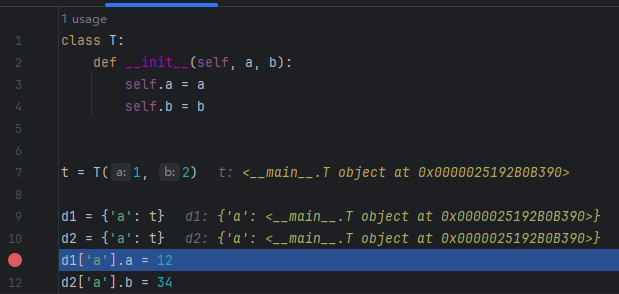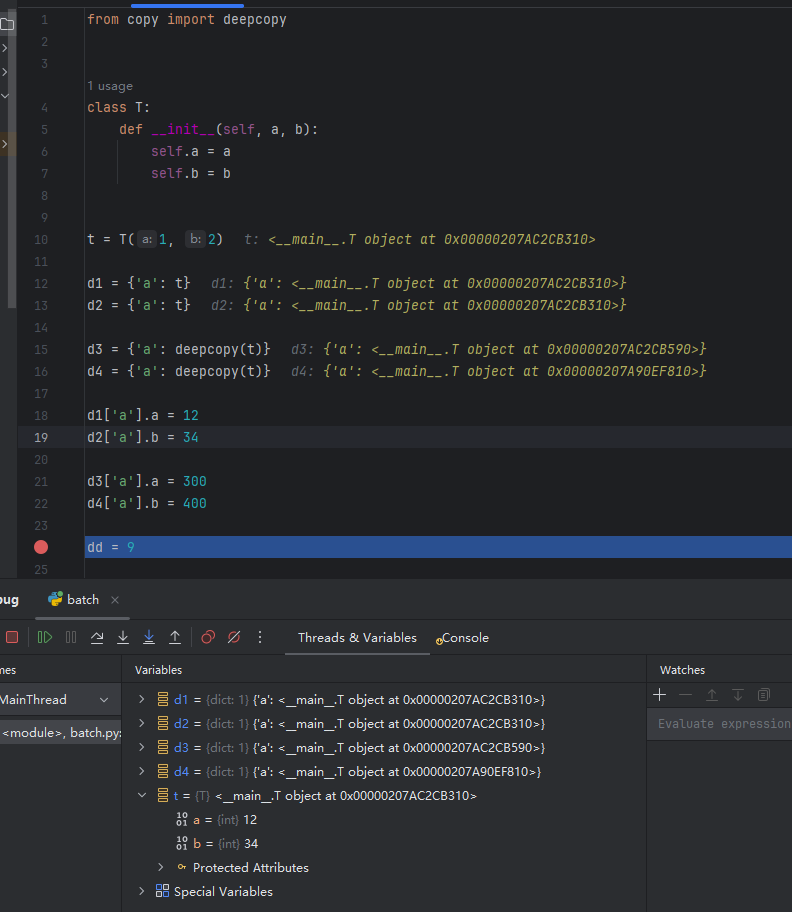DeepClone from 'lodash';` 深拷贝 对象比较 深复制


Python311\Lib\copy.py
"""Generic (shallow and deep) copying operations.
Interface summary:
import copy
x = copy.copy(y) # make a shallow copy of y
x = copy.deepcopy(y) # make a deep copy of y
For module specific errors, copy.Error is raised.
The difference between shallow and deep copying is only relevant for
compound objects (objects that contain other objects, like lists or
class instances).
- A shallow copy constructs a new compound object and then (to the
extent possible) inserts *the same objects* into it that the
original contains.
- A deep copy constructs a new compound object and then, recursively,
inserts *copies* into it of the objects found in the original.
Two problems often exist with deep copy operations that don't exist
with shallow copy operations:
a) recursive objects (compound objects that, directly or indirectly,
contain a reference to themselves) may cause a recursive loop
b) because deep copy copies *everything* it may copy too much, e.g.
administrative data structures that should be shared even between
copies
Python's deep copy operation avoids these problems by:
a) keeping a table of objects already copied during the current
copying pass
b) letting user-defined classes override the copying operation or the
set of components copied
This version does not copy types like module, class, function, method,
nor stack trace, stack frame, nor file, socket, window, nor any
similar types.
Classes can use the same interfaces to control copying that they use
to control pickling: they can define methods called __getinitargs__(),
__getstate__() and __setstate__(). See the documentation for module
"pickle" for information on these methods.
"""
import types
import weakref
from copyreg import dispatch_table
class Error(Exception):
pass
error = Error # backward compatibility
try:
from org.python.core import PyStringMap
except ImportError:
PyStringMap = None
__all__ = ["Error", "copy", "deepcopy"]
def copy(x):
"""Shallow copy operation on arbitrary Python objects.
See the module's __doc__ string for more info.
"""
cls = type(x)
copier = _copy_dispatch.get(cls)
if copier:
return copier(x)
if issubclass(cls, type):
# treat it as a regular class:
return _copy_immutable(x)
copier = getattr(cls, "__copy__", None)
if copier is not None:
return copier(x)
reductor = dispatch_table.get(cls)
if reductor is not None:
rv = reductor(x)
else:
reductor = getattr(x, "__reduce_ex__", None)
if reductor is not None:
rv = reductor(4)
else:
reductor = getattr(x, "__reduce__", None)
if reductor:
rv = reductor()
else:
raise Error("un(shallow)copyable object of type %s" % cls)
if isinstance(rv, str):
return x
return _reconstruct(x, None, *rv)
_copy_dispatch = d = {}
def _copy_immutable(x):
return x
for t in (type(None), int, float, bool, complex, str, tuple,
bytes, frozenset, type, range, slice, property,
types.BuiltinFunctionType, type(Ellipsis), type(NotImplemented),
types.FunctionType, weakref.ref):
d[t] = _copy_immutable
t = getattr(types, "CodeType", None)
if t is not None:
d[t] = _copy_immutable
d[list] = list.copy
d[dict] = dict.copy
d[set] = set.copy
d[bytearray] = bytearray.copy
if PyStringMap is not None:
d[PyStringMap] = PyStringMap.copy
del d, t
def deepcopy(x, memo=None, _nil=[]):
"""Deep copy operation on arbitrary Python objects.
See the module's __doc__ string for more info.
"""
if memo is None:
memo = {}
d = id(x)
y = memo.get(d, _nil)
if y is not _nil:
return y
cls = type(x)
copier = _deepcopy_dispatch.get(cls)
if copier is not None:
y = copier(x, memo)
else:
if issubclass(cls, type):
y = _deepcopy_atomic(x, memo)
else:
copier = getattr(x, "__deepcopy__", None)
if copier is not None:
y = copier(memo)
else:
reductor = dispatch_table.get(cls)
if reductor:
rv = reductor(x)
else:
reductor = getattr(x, "__reduce_ex__", None)
if reductor is not None:
rv = reductor(4)
else:
reductor = getattr(x, "__reduce__", None)
if reductor:
rv = reductor()
else:
raise Error(
"un(deep)copyable object of type %s" % cls)
if isinstance(rv, str):
y = x
else:
y = _reconstruct(x, memo, *rv)
# If is its own copy, don't memoize.
if y is not x:
memo[d] = y
_keep_alive(x, memo) # Make sure x lives at least as long as d
return y
_deepcopy_dispatch = d = {}
def _deepcopy_atomic(x, memo):
return x
d[type(None)] = _deepcopy_atomic
d[type(Ellipsis)] = _deepcopy_atomic
d[type(NotImplemented)] = _deepcopy_atomic
d[int] = _deepcopy_atomic
d[float] = _deepcopy_atomic
d[bool] = _deepcopy_atomic
d[complex] = _deepcopy_atomic
d[bytes] = _deepcopy_atomic
d[str] = _deepcopy_atomic
d[types.CodeType] = _deepcopy_atomic
d[type] = _deepcopy_atomic
d[range] = _deepcopy_atomic
d[types.BuiltinFunctionType] = _deepcopy_atomic
d[types.FunctionType] = _deepcopy_atomic
d[weakref.ref] = _deepcopy_atomic
d[property] = _deepcopy_atomic
def _deepcopy_list(x, memo, deepcopy=deepcopy):
y = []
memo[id(x)] = y
append = y.append
for a in x:
append(deepcopy(a, memo))
return y
d[list] = _deepcopy_list
def _deepcopy_tuple(x, memo, deepcopy=deepcopy):
y = [deepcopy(a, memo) for a in x]
# We're not going to put the tuple in the memo, but it's still important we
# check for it, in case the tuple contains recursive mutable structures.
try:
return memo[id(x)]
except KeyError:
pass
for k, j in zip(x, y):
if k is not j:
y = tuple(y)
break
else:
y = x
return y
d[tuple] = _deepcopy_tuple
def _deepcopy_dict(x, memo, deepcopy=deepcopy):
y = {}
memo[id(x)] = y
for key, value in x.items():
y[deepcopy(key, memo)] = deepcopy(value, memo)
return y
d[dict] = _deepcopy_dict
if PyStringMap is not None:
d[PyStringMap] = _deepcopy_dict
def _deepcopy_method(x, memo): # Copy instance methods
return type(x)(x.__func__, deepcopy(x.__self__, memo))
d[types.MethodType] = _deepcopy_method
del d
def _keep_alive(x, memo):
"""Keeps a reference to the object x in the memo.
Because we remember objects by their id, we have
to assure that possibly temporary objects are kept
alive by referencing them.
We store a reference at the id of the memo, which should
normally not be used unless someone tries to deepcopy
the memo itself...
"""
try:
memo[id(memo)].append(x)
except KeyError:
# aha, this is the first one :-)
memo[id(memo)]=[x]
def _reconstruct(x, memo, func, args,
state=None, listiter=None, dictiter=None,
*, deepcopy=deepcopy):
deep = memo is not None
if deep and args:
args = (deepcopy(arg, memo) for arg in args)
y = func(*args)
if deep:
memo[id(x)] = y
if state is not None:
if deep:
state = deepcopy(state, memo)
if hasattr(y, '__setstate__'):
y.__setstate__(state)
else:
if isinstance(state, tuple) and len(state) == 2:
state, slotstate = state
else:
slotstate = None
if state is not None:
y.__dict__.update(state)
if slotstate is not None:
for key, value in slotstate.items():
setattr(y, key, value)
if listiter is not None:
if deep:
for item in listiter:
item = deepcopy(item, memo)
y.append(item)
else:
for item in listiter:
y.append(item)
if dictiter is not None:
if deep:
for key, value in dictiter:
key = deepcopy(key, memo)
value = deepcopy(value, memo)
y[key] = value
else:
for key, value in dictiter:
y[key] = value
return y
del types, weakref, PyStringMap
import DeepClone from 'lodash';```
var newArray = DeepClone.cloneDeep(this.state.imageArray);```
import _ from 'lodash';
function isDeepStrictEqual(object1, object2) {
return _.isEqual(object1, object2)
}
let b=_.cloneDeep(a);
lodash.cloneDeep | Lodash 中文文档 | Lodash 中文网 https://www.lodashjs.com/docs/lodash.cloneDeep
var objects = [{ 'a': 1 }, { 'b': 2 }];
var deep = _.cloneDeep(objects);
console.log(deep[0] === objects[0]);
// => false
递归
/**
* 深拷贝
* @param obj 要拷贝的对象
* @param options 可以配置ignore数组设置忽略的项目
* ```js
* const a = { a: { b: 1 } };
* const c = deepClone(a);
* ```
*/
const deepClone = (obj, options) => {
const o = obj.constructor === Array ? [] : {};
for (const i in obj) {
if (options?.ignore && options.ignore.indexOf(i) >= 0) {
continue;
}
// eslint-disable-next-line no-prototype-builtins
if (obj.hasOwnProperty(i)) {
o[i] = obj[i] && typeof obj[i] === 'object' ? deepClone(obj[i]) : obj[i];
}
}
return o;
};
export default deepClone;



